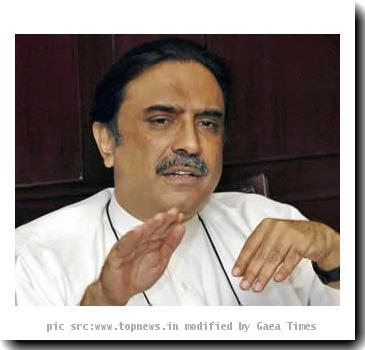In former Taliban stronghold, US military wins friends with rescue missions amid floods
By Chris Brummitt, APTuesday, August 10, 2010
US aid winning friends in flood-ravaged Pakistan
KALAM, Pakistan — U.S. Army choppers carrying emergency food and water buzzed over the swollen river and washed-out bridges, landing in the valley once controlled by the Taliban. They returned laden with grateful Pakistani flood survivors — newly won friends in a country where many regard America as the No. 1 enemy.
With Pakistan reeling from two weeks of flooding that has killed 1,500 and affected nearly 14 million people, the aid and rescue mission by the U.S. military gives Washington a chance to strengthen a sometimes troubled alliance that is crucial to fighting militancy in the region and ensuring a stable Afghanistan.
Besides helping those trapped by the high water, the U.S. assistance already is having another effect: The Pakistani Taliban denounced it and urged a boycott of Western aid.
Other U.S. relief missions to disasters in the Muslim world — including the 2005 earthquake in Pakistan-controlled Kashmir and the 2004 tsunami in Indonesia — were credited with improving the image of the United States, at least in the short term.
Now, as U.S. troops work side by side with Pakistani forces, the mission may relieve some pressure on the civilian government in Islamabad. President Asif Ali Zardari, who returned Tuesday to Pakistan, has been criticized for being abroad since Aug. 1, amid one of the worst natural disasters in his country’s history.
The United Nations said hundreds of millions of dollars in international assistance would be needed. In Washington, the State Department announced an additional $20 million in flood relief, bringing the total U.S. aid in the crisis to $55 million.
A spokesman for the Pakistani Taliban, which has attacked international aid workers in the past and has long opposed foreign assistance, said it would fund relief efforts.
The foreign aid “is deceiving the nation. It will not reach the affected people, but will be pocketed by corrupt rulers,” Azam Tariq told The Associated Press by telephone, adding the disaster was God’s punishment to Pakistanis for accepting secular leaders.
Highlighting the stakes for Pakistan and the United States is the quick work in badly affected areas by hard-line Islamist charities, including one with alleged militant links. With civilian authorities overwhelmed, concerns are rising the disaster will build support for the extremists, and perhaps even undo recent security gains.
The U.S. assistance is focused on the Swat Valley, which was under Taliban control until a Pakistani army offensive last year. Since then, it has been trying to rebuild with the help of the international community, which does not want the militants to return.
On Tuesday, four Chinooks — which can carry 100 people or 12,000 pounds (5,440 kilograms) of relief supplies — and two Blackhawks flew in from Bagram air base in Afghanistan, where nearly 100,000 U.S. troops are battling a related Taliban insurgency.
The U.S. also deployed 84 troops needed to fly and maintain the aircraft, and the soldiers huddled on the tarmac shortly before the flights resumed Monday after being grounded for three days by bad weather.
“Pakistanis are trapped by the floods. You will do whatever it takes to bring them back to safety. That is your mission now,” Col. Don Galli told them.
The helicopters soared over the Malakand Pass and into the Swat River valley, where they followed the waterway and passed over a dozen destroyed bridges and washed out roads. Mountains quickly rose up on either side of the aircraft.
They landed at Kalam, a town in the upper reaches of the Swat Valley that had been cut off for nearly two weeks. The floods destroyed dozens of buildings, including tourist hotels, and there was no food in the market and no electricity.
Pakistani soldiers supervised the unloading of the supplies and helped those who wanted to flee onto the U.S. helicopters.
“We have been waiting for this day for so long,” said Habib-ur-Rehman. “The Americans are God-fearing people, too.”
Another man who was named Saddam Hussein in honor of the Iraqi dictator later ousted by U.S. troops, said simply: “Thank you, America.”
The passengers raised their hands up in prayer as the chopper took off and the Americans handed out muffins to the children and the elderly.
Because of the general hostility in Pakistan to the United States, the mission was potentially sensitive for both countries. But so far, there has been no media or public backlash against the U.S. mission. In the past, any reported increase in U.S. Embassy personnel or army trainers has caused an outcry.
While it is still early in the mission, the American effort has yet to generate much coverage in the local media. The U.S. Embassy invited local and foreign journalists onto the aircraft to report on the aid effort.
Hamid Gul, a former Pakistani spy chief who is normally virulently anti-American and a vocal supporter of the Taliban in Afghanistan, welcomed the U.S. assistance.
“If they are operating in flood-hit areas, let them do this rescue work,” he said. “These Americans are not fighting.”
The Americans are the guests of the Pakistani army on an air base in northwest Pakistan. Pleased to be out of a battle zone, all said they were being treated well. Their hosts have even installed Western-style toilets and air conditioners in their sleeping quarters.
Three Pakistani soldiers from the U.S.-trained and equipped Special Services Group travel in each chopper, along with an assistant pilot. The U.S. servicemen carry only side arms and most stayed on or near the aircraft during the short stay in Kalam.
Pakistani Maj. Waheed Zaman said the United States “performed wonders” after the Kashmir quake.
“As far as the army is concerned, we are very thankful,” he said.
The U.S. Army staged a much larger aid operation in Indonesia after the tsunami, contributing to positive views of America. One village even named its main street after then-President George W. Bush.
The floods come at a delicate time in relations between U.S. and Pakistani forces. Ties had been improving, but were dented somewhat by the leak of classified military documents that showed past contacts between Pakistan’s spy agency and the Afghan Taliban.
Teresita Schaffer, director of the South Asia program at the Center for Strategic and International Studies, said the relief mission was “just the kind of thing the United States ought to be doing” because it show Pakistanis that America cared.
“The main reason is to help a friend in need, but that does not mean you should not be aware of the potential good side effects,” she said.
Associated Press writer Rasool Dawar in Peshawar contributed to this report.
Tags: Afghanistan, Asia, Asif Ali Zardari, Central Asia, Embassies, Emergency Management, Floods, Foreign Aid, Indonesia, Kalam, Militant Groups, North America, Pakistan, Search And Rescue Efforts, South Asia, Southeast Asia, United States

